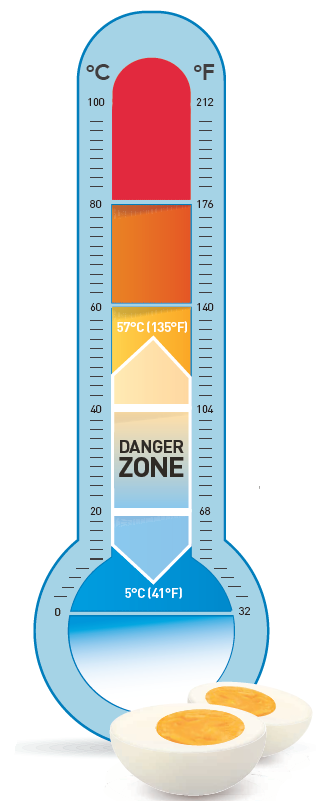Assuring the Safety of Eggs and Menu and Deli Items Made From Raw, Shell Eggs
Fresh eggs may contain bacteria called Salmonella Enteritidis (SE) that can cause intestinal infections. Most healthy people recover from these infections within 4-7 days, but they can lead to severe and even fatal illness, especially for those most vulnerable to foodborne disease — young children, the elderly, or persons who live in a facility that provides custodial care, and persons with immune systems weakened by health problems. Illness from eggs — or foods that contain them — can be prevented by proper preparation procedures and cooking to safe temperatures.
Receiving Eggs and Egg Products
- Shell eggs should be clean and sound.
- Raw eggs must be received in refrigerated equipment that maintains an ambient air temperature of 7°C (45°F) or less.
- Raw shell eggs that have not been specifically treated to destroy all viable Salmonella must be refrigerated at an ambient air temperature of 7°C (45°F) or below while stored and displayed.
- The label of all packages of raw shell eggs that have not been specifically treated to destroy all viable Salmonella must bear this safe handling statement—
SAFE HANDLING INSTRUCTIONS:
TO PREVENT ILLNESS FROM BACTERIA:
KEEP EGGS REFRIGERATED, COOK EGGS UNTIL YOLKS ARE FIRM, AND COOK FOODS CONTAINING EGGS THOROUGHLY.
- Accept liquid, frozen and dried eggs and egg products only if pasteurized.
Preventing Contamination
- Wash hands with warm, soapy water before and after they come in contact with eggs and egg containing foods. Use clean utensils or single-use gloves to handle ready-to-eat egg foods.
- Wash, rinse and sanitize utensils, equipment and work surfaces after preparing eggs or egg-containing foods.
- Keep cooked ready-to-eat eggs and egg-containing foods separate from raw animal derived foods during storage, preparation, holding or display.
- Substitute pasteurized eggs or egg products for raw shell eggs in preparing such foods as Caesar salad, hollandaise or béarnaise sauce, mayonnaise, eggnog, ice cream, and egg-fortified beverages that are not thoroughly cooked.
Cooking and Serving
- Cook raw shell eggs that are broken for immediate preparation and service to heat all parts of the food to a temperature of 63°C (145°F) or above for 15 seconds.
- Cook foods prepared with raw shell eggs that are not broken for immediate preparation and service to heat all parts of the food to a temperature of 68°C (155°F) for 17 seconds.
- Eggs and egg-containing foods cooked in a microwave oven should be: covered to retain surface moisture; rotated or stirred throughout or midway through cooking to promote even heat distribution; heated to a temperature of at least 74°C (165°F) in all parts of the food, and allowed to stand covered for 2 minutes before service.
Cooling
- Once cooked, eggs and egg-containing foods should be served immediately or cooled from 57°C (135°F) to 21°C (70°F) within 2 hours and from 21°C (70°F) to 5°C (41°F) or less within an
additional 4 hours.

Hot or Cold Holding
- If cooked eggs and egg-containing foods are held in hot holding equipment they should be held at a temperature of 57°C (135°F) or above.
- For cold holding, maintain cooked eggs and egg containing foods at 5°C (41°F) or below.
Added Safeguards for Highly Susceptible Populations
- Establishments that serve highly susceptible populations (young children, elderly persons, or persons who live in a facility that provides custodial care and individuals with
weakened immune systems), such as schools, day care centers, nursing homes and hospitals, should take the following additional precautions. Due to factors such as age, medications,
compromised or immature immune systems, and various health conditions, these populations are especially vulnerable to foodborne illness.
- In NO case should soft-cooked eggs, that are made from raw eggs, soufflés or meringues or other foods that contain raw or undercooked eggs be served in these facilities.
- As a general rule, pasteurized eggs or egg products should be used in any recipe that calls for combining more than one egg (“pooling”) and for any recipe, preparation or serving
procedure that involves holding eggs or egg-containing foods before or after cooking.
- To add an extra margin of safety, in addition to all of the above precautions, buyers can specify that suppliers provide eggs produced only from flocks managed under an SE control
program that is recognized by a regulatory agency that has animal health jurisdiction.
Consumer Advisory
Consumers should be informed by way of a disclosure and reminder of the significantly increased health risk —especially to young children, elderly, or persons who live in a facility that provides custodial care, and individuals with weakened immune systems —when eggs are eaten in a raw or undercooked form. Foods such as scrambled or fried eggs, French toast and omelets are frequently undercooked, while other foods, such as hollandaise or béarnaise sauce, mayonnaise, and chocolate mousse, may contain raw or under-cooked eggs. Consumers can be so informed by brochures, advisories on signs or menus, table tents, placards, labeling or other effective written means.


